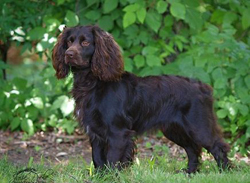Boykin Spaniels are medium-sized dogs with compact bodies and alert expressions. These dogs have a rich liver to chocolate brown coat that is flat to slightly wavy. The outer coat is medium length, while the undercoat is short and dense. There is some feathering on the chest, ears, belly, and legs. The eyes are brown and oval, and the ears are flat, feathered, and hanging. Boykin Spaniels measure 14 to 18 inches tall at the shoulder and weigh 25 to 40 pounds.
When raised in a loving home, Boykins become very outgoing, loyal, cuddly, and cheerful, and most have a great sense of humor.
This is a cheerful and energetic breed that does well with active families. These dogs get along great with children and other dogs, provided they are raised together. Boykins need a significant amount of exercise, and they especially enjoy swimming, hiking, and hunting.
In addition to being a great companion animal and talented retriever, the Boykin Spaniel is the State Dog of South Carolina.
Boykin Spaniels crave companionship. They are best suited to families with children, and they benefit from the company of other dogs. They are generally very friendly, and the breed is not known for being shy or aggressive. In fact, when raised in a loving home, Boykins become very outgoing, loyal, cuddly, and cheerful, and most have a great sense of humor.
These dogs love spending time outdoors, especially around creeks, rivers, and marshes. They are happiest when hunting waterfowl or wild turkey, but they have a lot of fun hiking with their human family members. They also enjoy participating in dog sports and obedience games, and they crave physical and mental stimulation. These dogs do decently in most settings, including apartments, provided they are given plenty of opportunity to go outdoors.
These dogs were not made to be alone. They want and need a lot of attention and affection from their family. They are known to form strong bonds with both humans and other dogs in their household, and they can become depressed and destructive if left alone for long periods.
Boykin Spaniels are generally healthy dogs, but they are more prone to certain health conditions than some other breeds are. Hip dysplasia, skin allergies, and some eye problems are fairly common in this breed, as is pulmonic stenosis, a congenital form of heart disease that causes a narrowing of the pulmonic heart valve. Additionally, Boykins are known to suffer from hemophilia A, a blood-clotting disorder, and distichiasis, a condition that involves abnormal growth of the eyelashes.
These dogs tend to put on weight easily, especially if they are not encouraged to exercise every day. Their diet should be monitored to prevent overfeeding and empty calories, and they should be given daily time outdoors for running and playing. Overweight or obese Boykins need evaluation by a veterinarian.
With proper nutrition, regular exercise, weight management, and routine veterinary care, Boykin Spaniels live up to 16 years.
Boykin Spaniels are easy to train, provided training is gentle, consistent, and fun. These dogs respond especially well to positive reinforcement, including play, praise, and food rewards. Overly harsh training methods will not work very well on this breed.
Boykins have a strong sense of smell that often triggers them to go running off after the faintest of scents. For their protection, they must be kept on a leash or in a securely fenced yard at all times. Training these dogs to stay and to resist pulling on their leash is also beneficial.
Some Boykins may develop into nuisance barkers, and some may have excessive energy levels throughout life. Early training and socialization can help minimize these negative behaviors. Additionally, early socialization can reduce the breed's tendency toward aggressive behavior directed at other dogs. It's important to purchase Boykins from a breeder who introduces puppies to a variety of sights and sounds very early in life.
A good brushing every few days is essential to prevent matting in the Boykin Spaniel's coat. First, the hair should be combed to remove existing mats and tangles, and then the hair should be brushed out with a slicker brush to remove dead and loose hair and reduce shedding. The coat should also be combed every time these dogs come inside. This is important, as Boykins tend to collect dirt, leaves, sticks, and other debris in their coats.
Boykins should be rinsed with freshwater after swimming in saltwater or in lakes or ponds with algae. These dogs like to swim, and in many cases, swimming takes care of all their bathing needs. However, bathing with a canine shampoo may be necessary to remove excessive dirt or harmful or sticky substances.
The nails need trimming regularly to prevent snagging, and this breed requires occasional cleaning and trimming between the paw pads. The ears should be cleaned weekly and checked for signs of infection or irritation. Regularly brushing the Boykin's teeth will keep their breath smelling fresh while reducing the risk of tooth decay and gum disease. Drinking water additives and dental treats are beneficial between brushings.
In the early part of the 1900s, a man named Alexander L. White found a small dog wandering near the church he attended in Spartanburg, South Carolina. Mr. White took the little dog home to keep as a pet, and then later sent it to his friend and hunting partner, Mr. L. Whitaker Boykin. Here, in a community just outside Camden, South Carolina, the little dog developed into a remarkable waterfowl retriever and turkey dog.
Mr. Boykin crossed this little dog, named Dumpy, with other breeds, including the Cocker Spaniel and the American Water Spaniel. This combination produced the Boykin Spaniel as we know it today.
The Boykin's small size and willingness to work for long periods make the breed a favorite among hunters. These dogs are still bred mostly in South Carolina, and their numbers are concentrated along the Atlantic Seaboard.
The American Kennel Club officially recognized the Boykin Spaniel in 2009.

